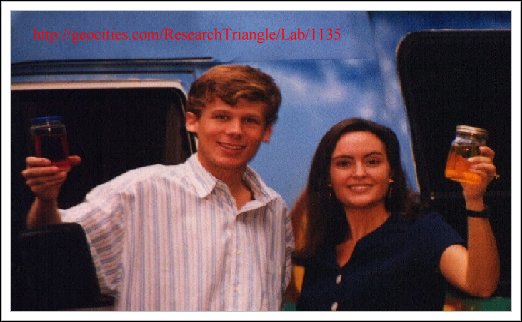

Josh and Kaia Tickell have an obsession. They collected used oil from fast food joints, cook it up with some special ingredients and then pour it into their Diesel 'Veggie Van'. They have toured the US on vegetable oil, and are spreading the word about this clean and great smelling fuel. Their story is as followsOn the smell of an oily french fry
Powered by vegetable oil, the Veggie Van took us 16,000 kilometers across the United States.
The Van visited 20 major cities and 25 states where people smelled the clean french fry-like exhaust.
Over 40 million people saw the multi coloured Veggie Van drive across their television screens. Thousands attended presentations about it, and hundreds of thousands more read about the van in their local newspapers and on the internet at the Veggie Van website.
What began as a college project culminated during the summer of 1997 in a massive public awareness campaign.
We knew that we had reached people from almost every walk of life when a person begging on the street shouted to us, "Hey isn't that the van that runs on that used vegetable oil?" We nodded in response and as we drove away the man shouted, 'That's incredible good luck!'
Fields of fuel in Germany
Luck had once taken us to a traditional farm in picturesque southern Germany where we had seen vehicles fueled by vegetable oil. While studying organic agriculture and living on this farm, we noticed that the farmers were continuously hauling tanks full of yellow liquid.
The farmers told us, "This is fuel from the Canola plants which grow on our farm and on Jorg farm up the road. We put it in the diesels and they smell good.' To our amazement the farmers poured the yellow liquid into their car and tractor, which then emitted a pleasant smelling exhaust.
What you didn't know about the diesel engine
More than 100 years ago, a brilliant inventor named Rudolph Diesel designed the original diesel engine to run on vegetable oil.
Over time the diesel engine was modified to run on cheap, dirty by-product of gasoline production, labeled 'diesel fuel'. Straight vegetable oil is too thick to run in most modern diesel engines, but bio diesel, a bio degradeable, nontoxic fuel made from vegetable oil, works in any unmodified diesel engine.
Not only does bio diesel require zero modification to the engine, but this fuel works either by itself or blended with petroleum diesel.
The process of converting vegetable oil into bio diesel fuel is called transesterification and is far less complex than it sounds.
In fact the process is so simple that it can be done in a blender.
A simple reaction
The chemicals needed to make bio diesel are cheap and easy to find.
Any vegetable oil (such as used in restaurants coil, ) methanol ( a clear alcohol used as racing fuel), and caustic soda ( a white powdery substance used as a drain cleaner ) are the basic components. During the conversion process the ingredients are heated and mixed and bio diesel and glycerin are created.
The glycerin can be used to make soap or any one of thousand of other products. Bio diesel fuel can be used directly in an unmodified diesel engine and it can burn up to 75 percent cleaner than petroleum diesel fuel.
Since bio diesel can be made from used cooking oil, we decided that it was time for us to take this idea on the road.
How it all began
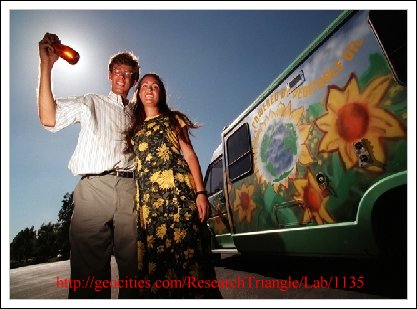
Two purple gleaming photovoltaic panels soon adorned its roof line. The panels allowed us to stay 'off the grid' because they powered the van's refrigerator, lights, computer, power tools and video equipment. Fueled by soft drinks and pizza, a rag-tag group of volunteer art students painted sunflowers and earth symbols on the van.
The Van Gogh-esque graphics and some well placed lettering told any onlooker that this Veggie Van was powered by vegetable Oil' got 1,300 Miles per Acre' and was on the Veggie Van USA Tour'. The exterior of the van hinted of the mechanical magic occuring inside the engine, which remained totally unmodified.
The Green Grease machine
The "Green Grease Machine' was created when we mixed salvage parts from scrap yards, boat marinas, and hardware store plumbing supplies with our blood, sweat and used restaurant cooking oil. First an old Champion juicer motor sucks vegetable oil from a restaurant fryer, then a converted tug boat filter strains the french fries and other bits of food out of the oil, and lastly the oil moves into a converted 1976 military stream kettle where an outboard boat motor swirls the ingredients together.
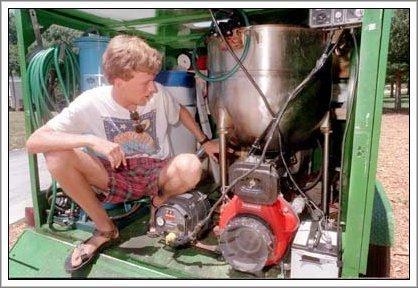
Some interesting experiments with vegetable oil and fryer grease gave way to our first large batch of bio diesel fuel.
Covered in grease, we watched as the dark fuel was poured into a secondary tank of our test vehicle, a diesel VW. As soon as the tank's valve was opened the fuel began to gurgle, the engine changed pitch and the air was filled with the odor of super-fried vegetable oil. Our experimental fuel actually worked!
For months, we experimented with various blends of vegetable oil, succeeding to run our VW Jetta on up to 80 per cent straight fryer grease for over 5,000 miles.
Life on the road
Phone calls and emails poured in from around the country as we planned the 1997 Veggie Van USA Tour. We talked to reporters, environmental organizations, music festival managers, and school teachers as we scheduled tour events and planned our route.
The trip itinerary filled quickly. We had the Veggie Van, the Green Grease Machine in a trailer and together they weighed almost 5 tons! The bio diesel fuel gave at least 10 per cet power gain over petroleum diesel and we felt every bit of it on the mountains.
Life on the road in the Veggie Van was a non-stop, colour full adventure.
At least one out of every four people who passed us on the highway waved, honked ,or gave us a big smile. We often turned our heads to absent-mindedly look at passing vehicles only to see a camera flash from the passenger side. In rest areas and parking lots, people gathered around the van, reading it's messages, taking pictures of family members next to it, and including it in their summer vacation home movies.
The first question people asked us was, 'Does it really run on vegetable oil?' One whiff of the exhaust was enough to convince most skeptics. Believe it or not, it does smell like french fries.
That summer we talked with farmers who want to run their equipment on oil from the crops that they grow.
We found that urban dwellers want public transport without the asphyxiating pollution. We met with CEO's environmental organizations, and people of all ages and backgrounds. We talked to 'snowbirds' in campgrounds, truckers in truck stops, and young men in fast red cars in traffic jams.
We talked to students of all ages who want to study clean technologies.
We heard the voices of a proud, caring people, who still love their country, their land, and their air. They want to use clean fuels in their cars and renewable energies in their homes.
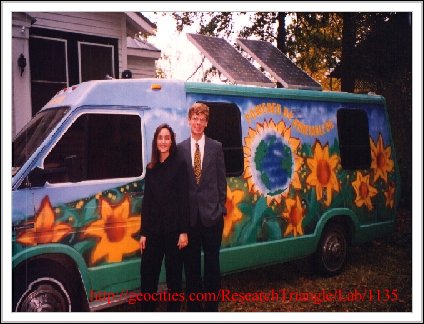
When the 1977 Veggie Van USA Tour officially ended in Hopland, California, The Veggie Van had been on the Today Show, Dateline NBC, Nightshift and many other news broadcasts across the country. The Associated Press circulated an article about the Veggie Van to hundreds of newspaers around the country. Wherever we arrived people said they had just read about us in the paper.
The Veggie van Website logged over half a million hits that summer and continues to receive hundres of visits a day.
The website was featured in Yahoo's weekly picks and in Internet Life magazine.
Power to the people
The 1997 Veggie Van USA Tour gave us proof that there are better ways to run cars And ultimately better ways to run our society. Every time we turned grease into clean fuel, We proved that we can create clean energy resources using our current technology. Our goal is empowerment of ourselves and others through education and information.
We wrote the book,
From the Fryer to the Fuel Tank; How to make Cheap, Clean Fuel from Free Vegetable Oil,
in response to the hundreds of emails letters, and phone calls we received requesting more information about the amazing fuel made from fryer grease. The first book about about biodiesel available gives simple easy to follow instructions for making fuel from vegetable oil. Everyone aged six to one hundred and six will find this book a humorous and insightful look into vegetable oil power, renewable energy and how to make cheap, clean fuel from free fryer grease.
The Veggie Van rides again
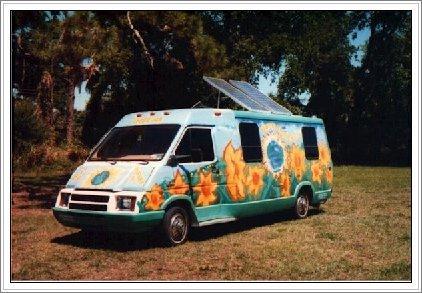
Meanwhile preparations for this years "Veggie Van Grease 'n' Go USA Tour' are underway. Starting in June, the fryer grease hits the Veggie Van fuel tank and the tires hit the road in another exciting cross-country adventure.
This year's tour goals are to have fun, make tons of fryer fuel and show up in unexpected locations to talk to people about renewable energy.
While the Veggie Van makes its way through the highways, bi-ways, and fast food restaurants of America this summer, the cyber - tour will be occuring online at www.veggievan.org. Events will be announced a few days ahead of time (so you have time to tell your friends that the Veggie Van is coming to your town.)
You can follow the adventures trials and tribulations of the Veggie Van by watching this site for our daily digital updates. The Cyber-Grease 'n 'Go Tour will feature stories, press and of course pictures of the clean burning odyssey as it unfolds.
Story by Josh and Kiara Tickell, Green Teach, 15 Paradise Plaza Suite 311,Sarasota, FL 34239, Fax + 1 813- 354 -2377
This web page created with the kind permission from the Home Power magazine www.homepower.com
and from the original authors and Photographs from Josh and Kiara Tickel who's website is The book From the Fryer to the Fuel Tank is available through the website
www.veggievan.org

